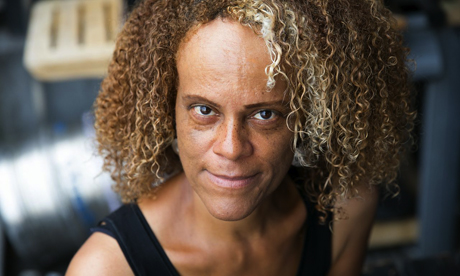Author Bernardine Evaristo on why her new novel ‘may stir up animosity’

Bernardine Evaristo. Photograph: Eleonore de Bonneval
Bernardine Evaristo likes to defy stereotypes.
“It’s what you have to do as a writer,” she says. “You tell stories that have not been told or show things from a different perspective.”
She is the author of seven books including Blonde Roots, a satirical novel about powerful African imperialists who capture white slaves from Europe.
Her latest novel, Mr Loverman, which is scheduled to hit the bookshop shelves next month, is similarly contrary.
Its protagonist is Barrington ‘Barry’ Jedidiah Walker Esq, a 74-year-old Antiguan man who came to Hackney in the 1960s and lives in Cazenove Road, Stoke Newington.
Barry is a prosperous man who owns several properties and has a church-going wife as well as kids and grandchildren.
But he has “lived a lie” – as Evaristo puts it – because he has been in a gay relationship with his best friend Morris since the pair’s teenage years.
Antigua, and Caribbean countries generally, are not known for their progressive attitudes towards homosexuality.
“I’ve been told there are no openly gay people in Antigua,” says Evaristo. “I don’t want to make assumptions and generalisations about various black communities, but the fact that so few people from those communities are out and gay does tell you something about attitudes.”
She says the novel is “the kind of book that may stir up some animosity” as a result of its taboo subject matter.
“Barry is a character who is deeply embedded in the Caribbean community,” she adds. “I wrote this book to explore an area that is really considered taboo and is not explored at all in British fiction, not even by black British writers.”
Evaristo has a wonderful ear for language, and part of the book’s joy is its protagonist’s luxuriant Caribbean patter, which captures his laid back, gentlemanly style.
“His voice is based on one of my oldest friends,” she says. “I’ve known her since 1979 and she’s from Antigua originally, and I’ve heard her voice for so many years that when I was writing Barry, it’s her voice I heard.”
Hackney also plays a starring role, with landmarks including Ridley Road Market namechecked.
“Barry has sort of recreated his island here, in the small area where he lives and where his properties are,” says Evaristo, who grew up in Woolwich, where her Nigerian father was a Labour councillor for many years.
Her mother, a white English Catholic, had scandalised her family when she announced her intention to marry a black man.
“I first came to Hackney in 1982 and have been coming back ever since,” says Evaristo. “I’ve been doing some research into my family tree and I have discovered that in 1838 on my mother’s side, I had relatives living on Shacklewell Lane, so my links to this area go back a very long way.”
Before becoming a writer she trained as an actor and founded a theatre company based at Centerprise, the now defunct hub of black community activity in Dalston.
The area has changed a lot since then, and some of this is captured in Mr Loverman.
“Hackney, and certainly Stoke Newington, is very much explored through Barry’s eyes,” she says. “He talks at one stage about all the different people that have lived there over the years – the hippies and the luvvies.
“I remember Hackney 30 years ago and you did have the hippies and the alternative people, but it wasn’t moneyed at all.
“Barry is of the generation that is dying out now, but he is actually a rich landlord, so he’s prospered from the gentrification of Hackney.
“I wanted him to completely defy all the stereotypes. He’s not poor, long suffering and embittered. He’s rich and he’s got a very positive outlook on life.”
Unsurprisingly, she also thinks the term ‘black writer’ can be somewhat problematic, but she has reconciled herself to it.
“It never goes away,” she says, “those categorisations ‘black writer’ and ‘woman writer’. I just accept it for what it is.
“If you were to talk about white writing, you wouldn’t be able to define it.
“I kind of like the word afro-diasporic. I do write about afro-diasporic stories, and that is what I’m interested in. I’m not going to write the kind of story that Hilary Mantel or Ian McEwan write. They’re writing from a different demographic.
“If they want to call me a black writer, I’m beyond it now. I call myself it when I feel like it. I wear the hat as and when it suits.”
